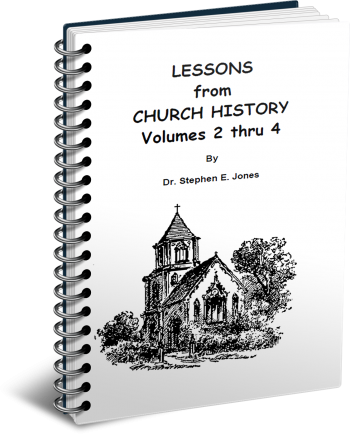Latest Posts
View the latest posts in an easy-to-read list format, with filtering options.

Volumes 2-4. This is the history of the Church from the Roman War (66-73 A.D.) to Constantine and the Council of Nicea in 325 A.D. with lessons to be learned from it.
Category - History and Prophecy

There was apparently a political power struggle in the Roman Church in 198 A.D. after Bishop Victor died. The outcome was that Zephyrinus was voted in as bishop instead of Hippolytus. Tertullian was a presbyter in the Roman Church at this time and may also have been a candidate for bishop, but the fact that shortly after the election he left Rome and returned to North Africa, the place of his birth, tells us that he was not a supporter of Hippolytus. But Jerome also tells us that he joined the Montanists because of the abuse he received at the hands of Zephyrinus. So it is certain that he was not a supporter of Zephyrinus either and, in fact, must have been perceived as another political rival.
Hippolytus and Tertullian each were more capable of the position from an intellectual position. Hippolytus himself calls Zephyrinus “an uninformed [or ignorant] and shamefully corrupt man” in Book IX of A Refutation of All Heresies. Hippolytus himself was well read, for in ten volumes under this title he refuted virtually every Greek philosophy and Church heresy up to his own time. He obviously felt that he was intellectually entitled to the bishopric, based upon his knowledge of heresies and what was orthodox Christian doctrine.
Tertullian apparently was not impressed. The fact that he turned to Montanism shows that he rejected soulish (intellectual) knowledge as a qualifier for the bishopric. The Montanists focused upon being spiritual, rather than soulish. So it is likely that after the Roman Church had split, Tertullian found a home in neither camp, and for this reason he returned to North Africa where he made a name for himself.
In my view, intellect is good, as long as it remains subject to one's spiritual side, for it is the spirit of man that houses the Holy Spirit of God. Intellect is not evil in itself, but yet its tendency since Adam's sin has been to dominate or overrule the spirit when it does not understand the ways of the spirit. The soul tends to believe its perceptions, which are based upon its own limited experience and education. The soul mistrusts the spirit, because the spirit lives by divine revelation that is outside of soul’s earthly experience.
The ideal, however, is for the soul to subject itself to the leading of the spirit (and therefore the Holy Spirit as well), for that is true Faith. Faith is not devoid of intellectual activity, nor yet of physical things. True Faith merely subordinates these things to the divine revelation of the spirit. Body and soul then become the willing servants of the spirit, saying “Amen” to all that the spirit reveals and leads them to do.
The difficulty in this, of course, is in the fact that people have a hard time distinguishing between the soul and the spirit. There have been more “heresies” determined by soulish study than true revelations by the spirit. This I attribute largely to the idols of one's heart, as Ezekiel 14 calls them. These “idols” are the soul's strong opinions or desires, emotional scars, and past circumstances where we have rejected truth or the leading of the spirit.
Most of these idols are hidden, in that we think they are gods (or the Holy Spirit), but in fact they are mere counterfeits—“graven images,” so to speak—gods created in our own image and likeness. Because we are convinced that these are truly God, it is difficult to see otherwise. Jesus said in Matt. 6:23, “If therefore the light that is in you is darkness, how great is the darkness!” In other words, if we perceive the darkness as light, the darkness is even greater. If we perceive the idol to be God, we stand little chance of overthrowing it. All such idols blind us and bias us against true revelation, and only by the grace of God can we be healed and set free of those idols in the heart.
Yes, I speak from a certain amount of personal experience here. I have seen some great idols come crashing down in certain past crises in my life. But there is no way that I can count the remaining idols, for if I could do so, I would have removed them long ago. So I have learned that I can only put my trust in God's grace, that He will work in my heart to accomplish what I cannot do on my own. Meanwhile, I share that which my heart currently believes, in the hope that these things can be of help to some of you as well. For a more complete Bible study on the idols of the heart, see chapter 2 of my book, Hearing God's Voice.
Montanus, I think, discovered some very good truths, and these are the things that attracted Tertullian. Montanus wanted to walk by divine revelation, rather than soulish intellectualism. Montanus saw a developing problem of clericalism, whereby men were subject to men, rather than to God. He wanted all men to have a direct relationship with God, rather than subject their revelation to the souls of intellectual heresy hunters such as Hippolytus. But, in regard to the Montanists, Philip Schaff says in his History of the Christian Church, Vol. II, p. 424,
“But they only brought another kind of aristocracy into the place of the condemned distinction of clergy and laity. They claimed for their prophets what they denied to the Catholic bishops. They put a great gulf between the true spiritual Christians and the merely psychical; and this induced spiritual pride and false pietism.”
In theory, Montanus had some good truth. But in practice, he ran headlong into the problem of heart idolatry. He merely turned from the heart idolatry of the Church Hierarchy to a more personal heart idolatry. In practice, he merely substituted one graven image for another. Now, instead of depending upon Church leaders, with their heart-idols, to determine truth and heresy, he now had to depend upon himself, not knowing that he too had idols that were only shaped differently from those in the Church.
Maximilla, one of the two women who accompanied Montanus, prophesied: “After me, there is no more prophecy, but only the end of the world.” I do not know when she died, but I know that the end of the world did not occur then. Further, I have heard much prophecy in my own time and experience, so I know it has not yet ceased. But in such a statement, Maximilla manifests spiritual pride, which is certainly not a fruit of the Spirit. It comes out of the very soul realm that the Montanists condemned in others.
We do not know much detail about the two women who left their husbands to follow Montanus, but similar “leading of the Spirit” is all too common even today. I have been utterly amazed at how many “prophets” eventually get the “revelation” that they are to engage in fornication, adultery, or polygamy. We read about others who were “told by God” to murder others—even their own children. Here is where the written word has a primary value, for it provides us with revelation from past prophets with which to compare and judge our own revelation. And in the area of morality, here is where the law has special value. I have never known a lawless prophet to escape immorality, fraud, or thievery.
Lawlessness is inevitably accompanied by legalism, for when one discards the law of God, one always begins to replace it with the traditions of men. Thus, Schaff tells us on page 425,
“Finally, the Montanistic sect was characterized by fanatical severity in asceticism and church discipline. It raised a zealous protest against the growing looseness of the Catholic penitential discipline, which in Rome particularly, under Zephyrinus and Callistus, to the great grief of earnest minds, established a scheme of indulgence for the grossest sins and began, long before Constantine, to obscure the line between the church and the world. Tertullian makes the restoration of a rigorous discipline the chief office of the new prophecy.
“But Montanism certainly went to the opposite extreme and fell from evangelical freedom into Jewish legalism; while the Catholic Church in rejecting the new laws and burdens defended the cause of freedom.”
Montanism's holiness movement attempted to correct what it saw as substandard Christianity. But in judging the Church without an understanding of the law by the mind of Christ, they merely established more rigorous man-made laws. The same legalism seen in those days has continued to the present, differing only in form. In the early days it was expressed in the ideas of celibacy, although the fact that God established marriage in the beginning hindered them from making their case. They finally settled upon the belief that sexual relations were based upon “passion,” and that those who overcame such desires were more spiritual than others. Many Church bishops were married, but expressed their preference for celibacy. Schaff tells us on page 409,
“At the same time the tendency towards clerical celibacy set in very early, and made steady and irresistible progress, especially in the West. This is manifest in the qualifications of the facts and directions just mentioned. For they leave the impression that there were not many happy clerical marriages and model pastors’ wives in the early centuries; nor could there be so long as the public opinion of the church, contrary to the Bible, elevated virginity above marriage.”
It seems to me that the early Church leaders had not yet discovered the distinction between an Old Covenant marriage and a New Covenant marriage, which I set forth in my book, Old and New Covenant Marriage. If their concept of a perfect marriage was one where the wife was a bondwoman like Hagar (Gal. 4:22-25), it is little wonder that the bishops had so few happy marriages. It is too often the same today, except that non-Catholic clergy today have the advantage in that they do not normally denigrate marriage itself.
And so developed the idea of clerical celibacy, even though it was well known that Peter, Paul, and Philip were married men. Schaff says on page 412,
“Sacerdotal marriage was first prohibited by Pope Siricius (A.D. 385), then by Innocent I (402), Leo I (440), Gregory I (590), and by provincial Synods of Carthage (390 and 401), Toledo (400), Orleans (538), Orange (441), Arles (443 or 452), Agde (506), Gerunda (517).”
In more recent years various churches have been free to establish their own legalisms, such as dress codes, hair codes, jewelry, makeup, and even reading the comic section of the newspapers on Sundays. Smoking and drinking are prohibited in other circles as defilements of God’s Temple. While we certainly have biblical statements about many of these things, most of them are not absolute prohibitions but appeals to moderation in all things.
There ought to be some standard of righteousness (i.e., right behavior) in any Church fellowship. Call it “Holiness,” if you will, but in my view, holiness cannot be measured by one’s actions, but one’s heart. Actions, of course, often reveal the heart, but judging such things is not always easy and obvious. The danger comes when the Church leaders who establish these legalisms have little knowledge of biblical law. Likewise, the more they know about Church history, the more they might see where such legalisms lead. The real value of studying Church history is to have some way of understanding and avoiding the mistakes of the past.